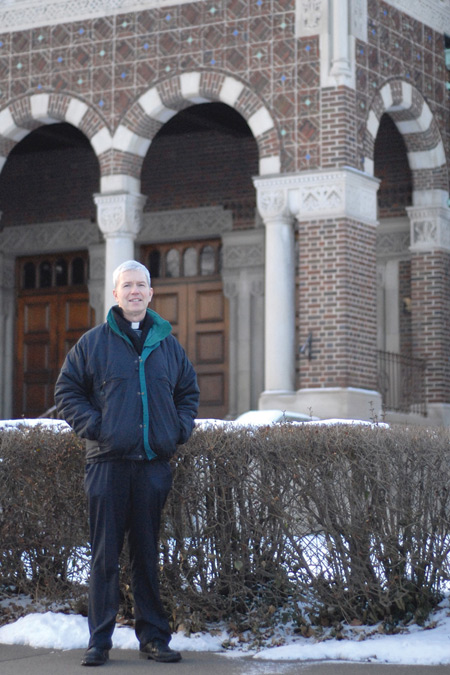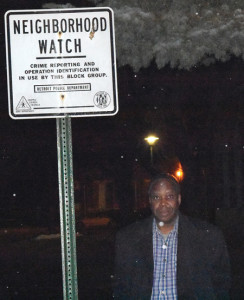Inner-city parishes serve as watchdogs, sources of unity for Detroit neighborhoods
 Msgr. Daniel Trapp, pastor of St. Augustine and St. Monica Parish on Detroit's East side, stands in front of the Church, which organizes a neighborhood association once a month to help fight crime and blight and build a sense of community.
Msgr. Daniel Trapp, pastor of St. Augustine and St. Monica Parish on Detroit's East side, stands in front of the Church, which organizes a neighborhood association once a month to help fight crime and blight and build a sense of community.Mike Stechschulte | The Michigan Catholic
Detroit — Once every so often, a passerby might notice a man walking around Detroit’s Osborn Neighborhood.
Dressed in black, surveying the streets, on the watch for crime or someone who may be in need of assistance.
No, this isn’t a review of the upcoming Detroit-filmed “Batman vs. Superman: Dawn of Justice.” It’s Fr. Michael Nkachukwu, pastor of Our Lady Queen of Heaven/Good Shepherd Parish, and he is one of many Detroit pastors who keep an eye out for his local neighborhood.
“When we talk about crime in the area, we talk in terms of what to look out for, to be vigilant,” Fr. Nkachukwu said. “We do feel crime in the area, not violent crime, but crime.”
Fr. Nkachukwu and the parish have been working with neighbors to form a neighborhood watch and host Block Club meetings, where residents gather at Our Lady Queen of Heaven’s parish hall to discuss neighborhood issues.
“Crime is here, but it’s more of vandalism, break-ins, often times scrappers looking for metal to sell,” Fr. Nkachukwu said. “Whenever I see such problems, I turn the lights on, be more aware of the surroundings. For a larger extent, it needs to be neighbors looking after neighbors.”
Many Detroit residents in the neighborhoods have had to rely on each other to improve their community and look after one another — which is why inner-city pastors say the Church plays an important part in bringing a community together.
“We got involved with founding a neighborhood association, the Pingree Park Neighborhood Association,” said Msgr. Daniel Trapp, pastor of St. Augustine/St. Monica Parish on Seminole Street. “We got a neighborhood association going to have monthly meetings, talk about safety, beautification projects and building a sense of community.”
Msgr. Trapp said Catholic churches in Detroit’s neighborhoods serve as anchors, a place where blight stops and hope begins, even for those who aren’t Catholic.
“These parishes are very committed to our neighborhoods,” Msgr. Trapp said. “At St. Augustine/St. Monica, we’ve done alley cleanups, lot cleanups, and renovating houses in the neighborhood. I think parishes in the city now are vital to the revision of the city. Parishes are seeing people going about, joining our services. At our parish, we have a pregnancy center, a food house, a thaw center and a charter school.”
Pastors in the city believe the very presence of a Catholic church is a source of strength and solidarity for people, even if they aren’t Catholic or even religious.
“The presence of a Catholic church has an evangelization force,” said Fr. Robert Scullin, SJ, pastor of Gesu Parish in the city’s University District. “It’s a place to draw strength and unity from, even in a non-Catholic community. Evangelization doesn’t mean recruiting people. Evangelization means bringing Jesus together with people, which might not be in a church setting, but through outreach, childcare, boy scouts, and basketball programs.”
 Fr. Michael Nkachukwu, pastor of Detroit's Our Lady Queen of Heaven/Good Shepherd Parish, walks by a neighborhood watch sign in the parish's Osborn neighborhood
Fr. Michael Nkachukwu, pastor of Detroit's Our Lady Queen of Heaven/Good Shepherd Parish, walks by a neighborhood watch sign in the parish's Osborn neighborhoodOn Sunday afternoons, Fr. Scullin hosts open gyms at Gesu, where men, predominantly African-American, have the chance to play basketball, socialize and speak with Fr. Scullin about problems they might be facing.
“Evangelization means building a relationship, having them come to Jesus in some way, be it in an open church service or a healing serving,” Fr. Scullin said. “That’s evangelization right there. But we need more.
Priestly ministry in the inner city, he added, is a vocation that needs more emphasis.
“Being a pastor in the city is a profound experience that I don’t know if many seminarians consider,” he said. “You’ll meet Jesus in a profound way, and he won’t be Catholic half the time.”The biggest thing inner-city parishes can do for their neighbors and parishioners is adapt to the changing nature of Detroit’s demographics and needs, according to pastors and parish staff.
At St. Jude Parish on Seven Mile, the church serves as a place for the community food pantry, Alcoholics Anonymous meetings, and neighborhood block committee meetings.
“Our neighborhood has changed a lot over the past few years, but we’re a beacon of hope in the neighborhood,” said parish business manager and food pantry director Lynn McEachin. “The school was recently sold in 2011 to Regent Park Academy, but now there are more than 700 students in the school.
“We’re seeing a little revitalization in the neighborhood. The mayor has taken out a lot of homes, but it’s starting to create a positive feel. There is a lot to be happy about our neighborhood. Fr. Shafique (Masih) being appointed pastor of St. Jude and the other pastors in the city are an asset to the community and the archdiocese.”










